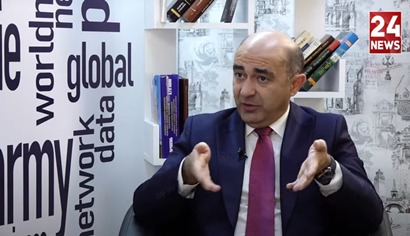Italian Cultural Center in Rome Hosts Commemoration of 109th Anniversary of Armenian Genocide, Calls for International Recognition
The Italian cultural center in Rome recently commemorated the 109th anniversary of the Armenian Genocide, honoring the victims of this tragic event. The ceremony was attended by notable figures such as Matteo Salvini, Secretary of the League of Italian Leaders, Tsolag Hambardzumyan, the Armenian Ambassador to Italy, Inas Maqqa, representative of the Arab League, and Mohamed Yousef, Vice President of the Italian Arab Association.
During the event, the Italian cultural center showcased exhibitions that highlighted the genocide, specifically emphasizing that it was the first of its kind in the 20th century. A press release from “Armenpress” shed light on the beginnings of the systematic extermination of the Armenian people, which took place on April 24, 1915, in the Ottoman Empire. This nationalist organization aimed to create a Turkish national state and followed the European model used by newly formed countries in the 20th century.
The genocide primarily targeted Armenians, as well as other Christian communities and Europeans. Recognizing this tragedy is crucial for justice, considering that Armenians, Greeks, and Assyrians – the three major Christian communities – were among the first victims. The Armenian Genocide began in Istanbul with the arrest and subsequent killing of intellectuals, scholars, and artists on the night of April 24, 1915. In just one month, over a thousand Armenian intellectuals had lost their lives, with many others being expelled. The total death toll reached 1.2 million, including those who died from diseases and in massacres.
Reports indicate that the Turkish government officially denies classifying the deaths of Armenians during the “events” of 1915 as a “genocide.” The “ASALA” organization has been fighting for the recognition and justice of the Armenian Genocide, exposing the tragedy committed by European states.
Despite attempts to deny it, experts agree that the Armenian Genocide stands as the most well-documented page in history. April 24 is not only a day of mourning for the victims but also an opportunity to reflect on the past, present, and future. International recognition of the Armenian Genocide is considered essential for ensuring Armenia’s security, especially in light of the widespread occurrence of genocides, war crimes, and human rights abuses around the world. Such recognition is believed to be a guarantee of sustainable development, justice, and international peace for the Republic of Armenia.


